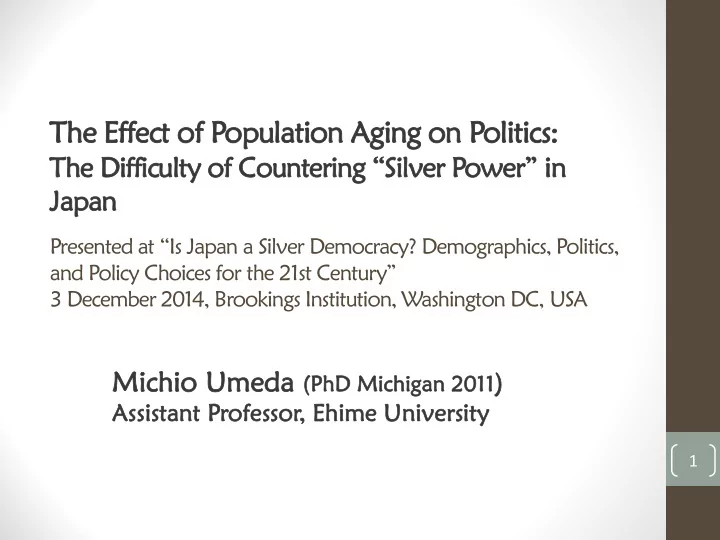

The E Effect ct o of P Population ion Aging on P Polit itics ics: : The Dif Difficulty of of Cou ountering “S “Sil ilver P Pow ower” ” in in Japan Presented at “Is Japan a Silver Democracy? Demographics, Politics, and Policy Choices for the 21st Century” 3 December 2014, Brookings Institution, Washington DC, USA Mi Michio io Umed Umeda (PhD Mic 2011 ) Michigan an 20 Assista tant t Profes essor, E Ehime U Univers ersity 1
Starting Point: Cross-national Comparison of Public Spending on Elderly and Non-Elderly Citizens 45 42.3 40 Elderly/Non-Elderly 38.5 Spending Ratio (ENSR) 35 average 1985-2000 (Lynch 28.9 30 2006, Table 2.7 pp 30) 24.7 25 18.6 20 17.4 16.0 15.7 14.0 15 12.9 11.4 10.4 10.2 5.8 6.5 7.1 8.3 8.9 9.3 9.9 10 5 0 2
The Structure is Getting Worse… 800 799 700 Percent Change in ENSR, 1960-2000 600 (Lynch 2006, Table 3.1 500 pp 45) 400 300 200 104 116 -80 -70 -58 -56 -53 -52 -32 -20 -6 17 23 42 49 50 76 86 92 100 0 -100 3
Huge Budget Deficit - The Japanese government is not a big spender in any sense (e.g. public spending/GDP). - However, Japan does not have enough tax or social security revenue to support benefits (e.g. pensions and medical service for elderly citizens). - As a result, Japan accumulates a large deficit each year to finance the current program, which will impose a heavy burden on future generations. 4
Question : - Politicians in Japan sometimes claim that we should raise taxes (e.g. consumption tax) in order “not to leave a debt to our children ( 子孫 に借金を残すな )” - At the same time, they rarely claim that we need benefit cuts (e.g. old-age pension) in order “not to leave a debt to our children.” - Why? Because it is politically suicidal! There are five electoral reasons of avoiding the C words. 5
Five reasons that politicians in Japan should not make grandmas unhappy (1): Number 12,000 Japanese Population Median (52 years) Structure of Eligible is here Voters (Oct 2013) 10,000 8,000 6,000 4,000 2,000 0 6
Five reasons that politicians in Japan should not make grandmas unhappy (2): T urnout 90% 80% 20- 70% 30- 40- 60% 50- 60- 50% 70- 40% Lower H Low Hous ouse T T ur urnout afte af ter Elec ecto toral al Reform 1 1996-20 2012 30% 1996 2000 2003 2005 2009 2012 7
Five reasons that politicians in Japan should not make grandmas unhappy (3): Preference 100% ISSP2006 more or less 80% government spending in OLD AGE 60% PENSIONS much less 40% less same as now more 20% much more 8 0% 20- 30- 40- 50- 60-
Five reasons that politicians in Japan should not make grandmas unhappy (4): Issue Salience 70% “Welfare” Issue Saliency, 1972-2009 (updated from Umeda 2012 based on 65% Meisui Electoral Survey) 60% 55% 20- 50% 30- 45% 40- 50- 40% 60- 35% 30% 25% 20% 9 1972 1976 1979 1980 1983 1986 1990 1993 1996 2000 2003 2005 2009
Five reasons that politicians in Japan should not make grandmas unhappy (5): Institutions - 1 5) The electoral system gives additional power to elderly and/or more active voters - A small “minimum winning coalition” under SMD with low turnout: 30% of district voters is enough to keep winning. - As such, candidates tend to focus on small core and active group of voters while campaigning. 10
Five reasons that politicians in Japan should not make grandmas unhappy (5): Institutions - 2 5) The electoral system gives additional power to elderly and/or more active voters - Malapportionment gives some additional voice to districts with older and more rural voters. - Those of the Upper House SMD/MMD push the weighted up median age of the voters by one year. 11
Conclusion The combination of these five factors (i.e. numbers, turnout, preferences, issue saliency and institutions) makes any benefits cut for the elderly extremely difficult in Japan. We may need stronger political leadership and/ or a crisis to override the elderly’s “ silver power “in Japan’s democratic processes. It may happen in the US too… 12
Recommend
More recommend